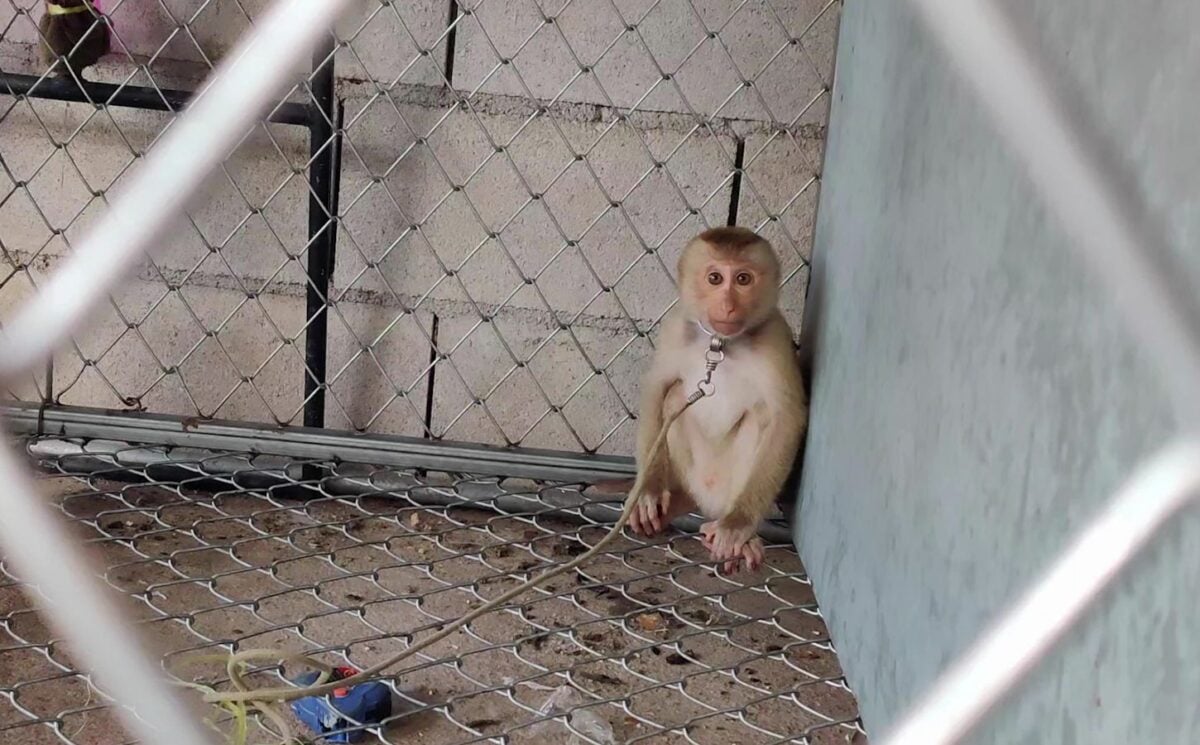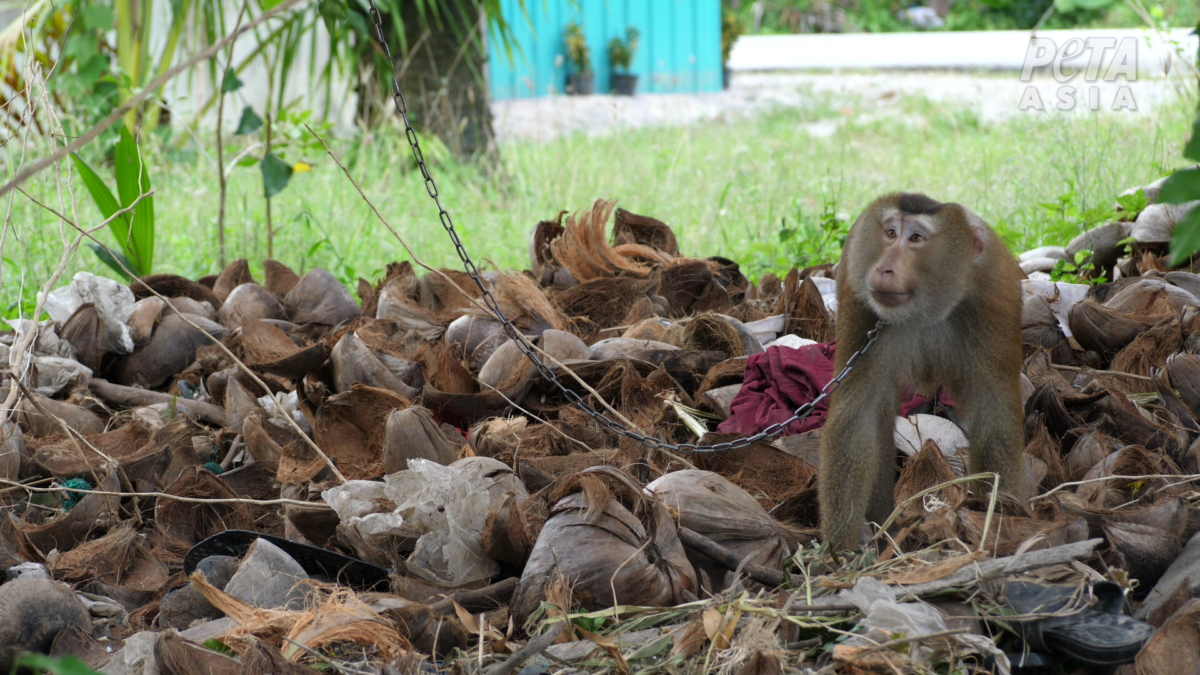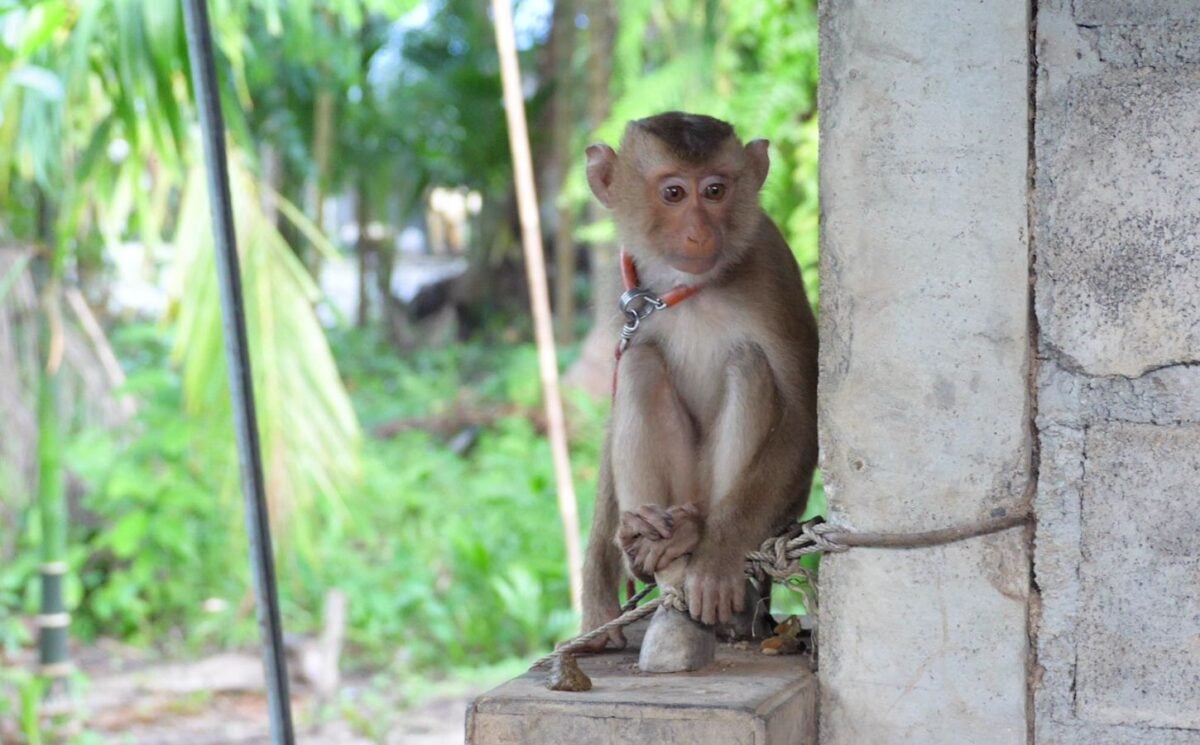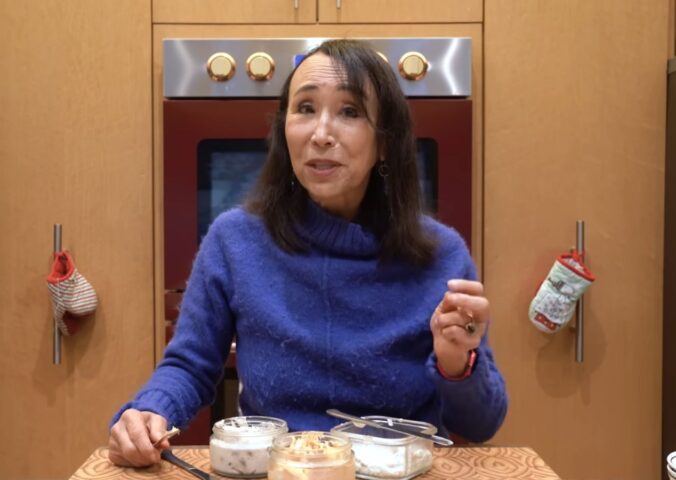Coconut milk is increasingly popular as a dairy milk alternative, a health food, and for use in skincare products. But some coconut milk brands have been selling a product made using the forced labor of captive monkeys.
Multiple investigations by PETA Asia into Thailand’s coconut industry have revealed that the exploitation and abuse of monkeys is rampant. Thailand is the tenth biggest coconut-producing country in the world.
Does this mean you should never buy coconut milk again? Not necessarily, as it’s possible to buy coconut milk made without monkey labor. Indeed, PETA’s investigations have helped to ensure that more retailers have dropped coconut brands using these abusive practices.
Here’s everything you need to know to make ethical choices when it comes to coconut products.
The investigations

PETA Asia has carried out three investigations into Thailand’s coconut industry, starting in 2019. After the first two provoked international outcry, the Thai government and coconut companies said that coconut products made for export no longer used monkey labor. PETA’s third investigation, which concluded in July 2022, revealed this as a lie.
The monkeys, mostly macaques, are reportedly illegally captured from the wild when they are still very young. They are made to wear rigid metal collars and kept on chains. Some monkeys were found to have had their canine teeth removed to prevent them hurting handlers.
The monkeys go through “training” to pick coconuts. Handlers intimidate and abuse them to make them obedient, using methods including hitting them and dangling them by their necks.
Trained monkeys are then sold to coconut farms. While climbing trees to pick coconuts, they can be bitten or stung by insects including deadly hornets. When they aren’t picking, they are kept chained up without any social interaction or safe and clean space to rest.
In 2021, the number of monkeys used in the coconut industry was estimated to be 3,000. About half of those were thought to have been caught in the wild, the other half captive-bred.
Companies implicated
PETA has identified a number of companies that make products from coconuts that may have been harvested by captive monkeys. “It’s impossible to guarantee that any canned coconut milk produced in Thailand … didn’t use forced monkey labor,” PETA says. While the following brands use coconut milk produced in Thailand, we do not know if their products are linked to monkey labor.
Chaokoh, Ampol Food (owned by Theppadungporn Coconut Co.), Aroy-D, Tropicana Oil, Thai Pure, Ampawa, Edward & Sons Trading Co., and Suree all use coconut milk produced in Thailand.
But many other brands use coconut milk from Thailand or that may come from Thailand. For example, Sainsbury’s and Tesco’s own-brand canned coconut milks are produced in Thailand. Blue Dragon Coconut Milk, which is sold in UK supermarkets, lists its country of origin as “Thailand or Philippines.”
The problem is, according to PETA, a lack of oversight of the coconut supply chain in Thailand. During its most recent investigation, PETA heard from industry insiders that coconut pickers lie about how they harvest coconuts. And it is the word of the pickers that the government and companies rely on when carrying out audits to ensure no monkey labor has been used.
For this reason, PETA has urged a boycott on all coconut products from Thailand. That includes products made from the coconut meat such as coconut flakes, flour, and oil. It says that coconut milk and other products from countries including the Dominican Republic, India, Indonesia, the Philippines, and Vietnam are free of monkey labor.
Retailers ditch Thai coconut milk

After PETA’s first investigation, retailers started ditching suppliers using Thai coconut milk. In the UK, Waitrose, Ocado, the Co-op, and Boots said they would stop selling the products.
In the US, Walmart, Target, Wegmans, Costco, Food Lion, and Stop & Shop dropped companies that had been accused of using monkey labor. PETA has a list of coconut milk brands that use coconut milk sourced from countries other than Thailand.
Recipe box company HelloFresh initially resisted pressure from campaigners to do the same. It finally removed monkey labor-linked products from its ingredients in 2023.
What about coconut milk that’s not in a can?
Coconut milk as a dairy milk alternative is pretty common these days, as are other dairy-free products like coconut yogurt. But it can be tricky to find out where companies source their coconuts for their dairy-free alternatives.
Pacific Foods in the US says it sources coconuts from producers who don’t use monkey labor. In the UK, Plenish gets its coconut milk from Sri Lanka.
Koko Dairy Free has a “Monkey Statement” on its website which says it has never used monkey labor. It also says its main suppliers grow shorter, hybrid trees from which coconuts can be harvested by people on the ground. Its coconuts are sourced from Indonesia, Malaysia or the Philippines. “We do not source coconuts from Thailand, in part because we cannot be sure that animals are not used in their harvesting,” it adds.
How are coconuts harvested without monkeys?
Coconuts were traditionally picked by humans who climbed the trees using ropes. They would pick the coconuts one at a time and drop them into baskets or onto the ground.
Modern coconut harvesting uses tools such as long poles with hooks or blades on the end to remove the coconuts. Some coconut farms may even use mechanical tree climbers and drones to help increase efficiency in harvesting. These tools save people from having to climb the trees, which can be dangerous. Trees selectively bred to be shorter also make it easier for coconuts to be harvested safely.
But there are still place where there may be a lack of equipment or safety regulations that endanger pickers. In Sri Lanka, for example, farmers still climb the massive trees themselves, risking life and limb.






